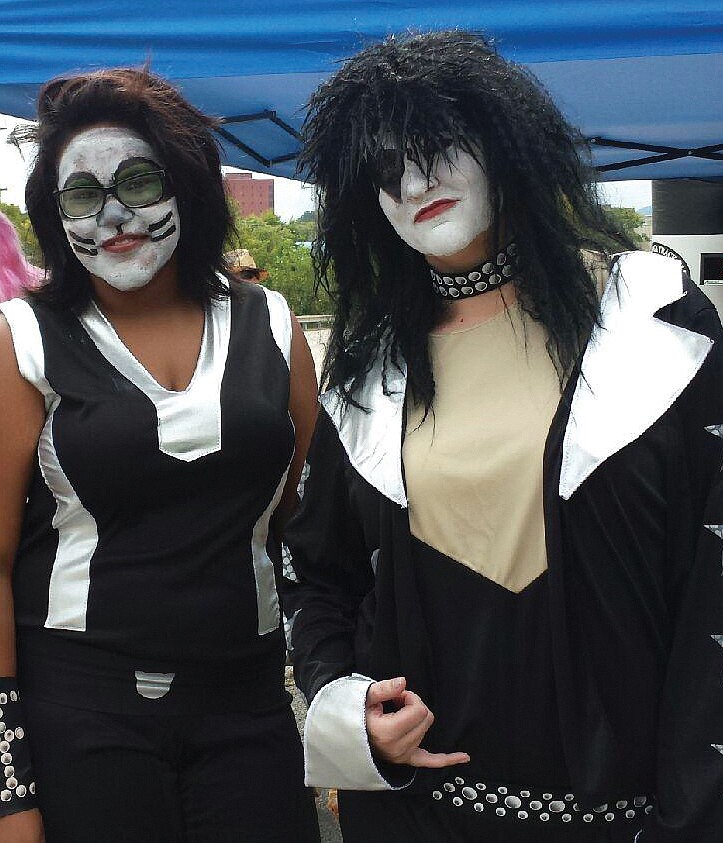It's mile 19. It's 85 degrees. You're hot, you're sticky, you're tired, but somehow your jellied legs keep pressing on - until you see the hill.
Tall and imposing, the incline makes you slow your jog to a trot. You want to give up. But then you hear a voice.
"You can do it!" comes a cry from the sidelines. "You're amazing! Just a little farther!"
The words sound far away, but they spark something in you. You reach into a reservoir of untapped willpower and find the tenacity to push on. Because you can do it, you remind yourself. You are amazing. You just needed a sentry to remind you.
Donning bright safety vests and brimming with positivity, race sentries are the unsung heroes of many local races. Appearing at intersections block to block, the volunteers are tasked with keeping runners on the right course and summoning services for those who might need medical attention - all while providing much-needed motivation.
Though motivation often means high-fives and cheering, sentries aren't afraid to get creative. Some wave signs. Some ring bells. And some, like Sarah Barnes, dress up as Wonder Woman.
Since getting involved with the Chattanooga Track Club about four years ago, Barnes has donned a variety of costumes to motivate other runners during local races. So far, she has been a pirate, a nun and "The Starchild" from KISS, to name a few.
"It makes people laugh and it catches them off guard," Barnes says.
Racers sometimes get an extra dose of silliness when Barnes recruits her two daughters to join her costumed capers, forming teams of superheroes and wannabe rock bands, or when she connects her getup to the race's theme. For instance, one year, she dressed as the sun for the Scenic City Scorcher.
"It's a real simple job, but you kind of make it your own," Barnes says.
For Karen Leavitt, head cross country coach at Notre Dame High School, that means making it loud. A longtime runner herself, Leavitt knows how precious a few words of encouragement can be for racers.
"Even if [runners] come with family and friends, their family and friends can't be in every spot where they need encouragement," she says.
The verbal push can change a racer's internal dialogue from "not gonna make it" to "one more mile," or convince them to power on to avoid disappointing their dozens of nameless, cheering fans, Leavitt says. And it doesn't always require a generic "you got this!" she adds. Sometimes, all it takes to re-energize runners is the promise of an aid station just a little ways ahead.
Iron Sentry
Local races are always a treat to volunteer for, but Ironman is different, says Leavitt, who hopes to take on a sentry position when the triathlons begin this September. Being a sentry, or “pointer” as it’s called for the worldwide event, is like having a front seat to the Olympics, she says — you get to direct the world’s top athletes as they zoom by.Organizers for this month’s Ironman events are aiming to recruit 4,000 volunteers, about 150 of which will serve as pointers. For each race, 70-100 pointers will be posted on the bike course, and 35 or more will be posted on the run course.Get your front row seat to the action by volunteering at tinyurl.com/IronChattPointer. Or, become a sentry for one of our homegrown races at volctc.org.
"It's encouraging to see people who were walking start running when they hear that encouragement," Leavitt says.
Even more encouraging is being a part of first-time racers' experiences, says Bill Brock, sentry coordinator for the Chattanooga Marathon, which enlists about 140 sentries to cover approximately 90 intersections each year. Seeing volunteers clap for them as they pass or jog alongside the stragglers to help them move toward the finish line is a source of inspiration, he says.
"Like anything else, you often get more out of it than you give," says Brock, who has served in sentry positions for more than 15 years. "That's one of the really powerful features of being a sentry: knowing that you're providing that support and that the participants are so appreciative of it."
